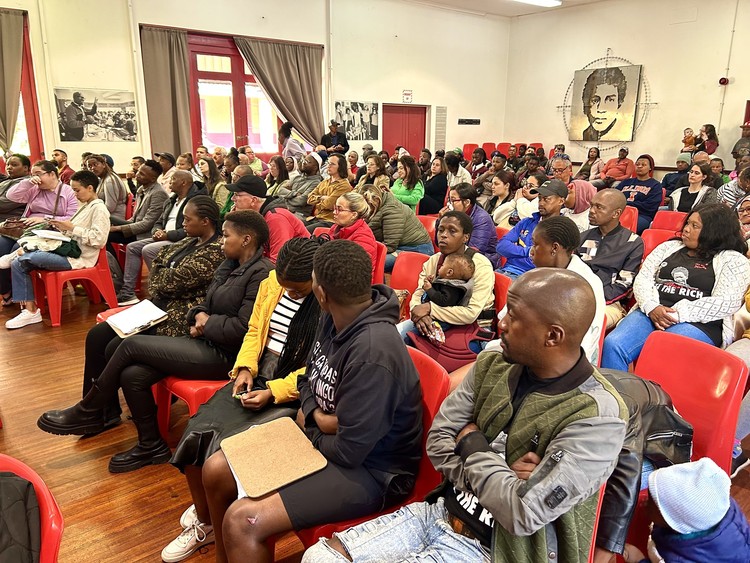
7 September 2024
Over 50 people attended a meeting in Salt River on Saturday to mobilise against pending teacher cuts. Photo: Matthew Hirsch
Scores of concerned parents, learners, teachers and union members gathered at Community House in Salt River on Saturday to discuss the planned retrenchment of thousands of teachers in the Western Cape.
The organisers of the meeting described themselves as “anti-capitalist, pro-working class group of independent activists”.
A total of 2,407 teaching posts are to be cut in the province by 1 January because of severe budget cuts. This is about 6% of the approximately 37,000 teachers in the Western Cape.
One of the organisers, Abeedah Adams, said about 100,000 learners would be affected. “We are looking at a situation where already overburdened teachers will have to take on even more work. [The budget cuts] are not limited to education; it’s all the services that we need to access.”
“Without a teacher, there is no learner … Please be with us in [this] fight,” Yonela Zembe, a learner from Khayelitsha, told the meeting.
Daphne Erosi, a parent organiser from Equal Education, said, “Learners cannot be in class without teachers. That’s what we have been fighting for all these years. We have been waiting for this moment. We need to hold hands and fight this together.”
Aliya Chikte, of the Alternative Information and Development Centre, blamed austerity policies. “It’s been a problem in South Africa for a long time.”
“We can see how spending in areas that are pro-poor is being de-prioritised. We all know that teachers are already underpaid in this country,” she said.
Clement Meyer, a teacher from Athlone High School, said he is in meetings with other teachers daily and they are very concerned. “This is a bread and butter issue. If we want to move forward, we have to mobilise the teachers. We must call for a meeting and I can guarantee that teachers will attend. You have to organise school communities.”
South African Democratic Teachers Union (SADTU) provincial secretary Sibongile Kwazi said that the province must redirect money to avoid losing teacher posts. She said the union would organise a meeting next week on the issue.
Several speakers argued that rural schools were being affected the most by the budget cuts.
The organisers suggested forums to organise teachers, learners and union members. There was also a call to organise in the build-up to the medium-term budget, set for the end of October.
In a statement on Thursday, Western Cape MEC for Education David Maynier urged teachers and unions to “fight alongside us, rather than against us”.
“Even if we cut all the programmes suggested by the teachers’ unions, we would not come anywhere close to dealing with the massive R3.8-billion budget shortfall,” he said. “The situation is critical. If we do not take drastic action to cover the massive shortfall, we compromise our ability to pay our bills, which includes the salaries of teachers.”
The department says that it has already cut R2.5-billion from budgets for non-personnel spending.
A statement by the recently appointed national Minister of Basic Education Siviwe Gwarube was circulated on social media on Saturday.
The statement makes it clear that the budget cuts affect all provinces.
It states that the minister met with the provincial education MECs on Friday.
“The meeting agreed that each province will undertake an analysis of the specific impact in their jurisdiction and report back to a special … meeting. As soon as this impact analysis is completed, I will convene an urgent meeting with the Minister of Finance to table these findings and work toward a solution that safeguards the future of our learners”.
She blamed the “fiscal challenges” on “years of poor policy choices related to the management of our country”.